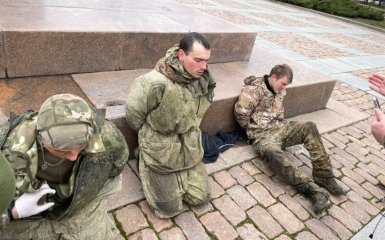As of December last year, 220 servicemen of the criminal army of the Russian Federation surrendered to the Ukrainian military through the “I Want to Live” hotline, according to FT.
What is known about possibility for Russian soldiers to avoid further participation in war against Ukraine
According to the journalists of the publication, citing Vitaliy Matvienko, a spokesman for the Unified Centre for Receiving Applications of Russian Servicemen for Surrender within the framework of the "I Want to Live" project, about 1,000 applications from servicemen of the occupying Russian army are currently being considered for surrender.
Russian Lieutenant Danilo Alfyorov did what the rest of Vladimir Putin's army, which has launched a full-scale invasion of Ukraine, has failed to do: he reached the centre of Kyiv. In October, sitting between two Ukrainian military intelligence officers, Alfyorov, 27, condemned his country's unprovoked war and said he had voluntarily surrendered, the newspaper reported.
It is noted that Alfyorov, who is a graduate of the Moscow Military School, contributed to the capture of 11 other soldiers of the Russian army.
All of them surrendered by calling the “I Want to Live” hotline.
The publication notes that the surrender of Russian soldiers under the programme of the Defence Intelligence of Ukraine called "Barynya" allowed Ukrainian military intelligence to obtain a lot of valuable information about the state of the Russian occupation army units in Ukraine.
Defence Intelligence of Ukraine (DIU) opened the hotline in September 2012 — just 3 days before the partial mobilisation announced by Kremlin dictator Vladimir Putin.
While Moscow mobilised about 300,000 reservists, the “I Want to Live” hotline began to burst with calls.
Someone gave me this number. Can you help me surrender? — the authors of the material give an example of one of the conversations of a Russian soldier with the operator of the “I Want to Live” line.
What is known about results of the "I Want to Live" hotline
The first case of successful voluntary surrender took place less than a month after the start of the “I Want to Live” project.
It is noted that since then, about three Russian servicemen have been captured every week.
So far, the hotline has received more than 26,000 calls by phone and via the Telegram chatbot. The hochuzhit.com website has been visited over 48 million times, including 46 million times from Russia. The site was blocked in Russia a few days after its launch, but remains accessible through services that hide the user's Internet address, the newspaper notes.
The spokesperson for the United Centre emphasises that both Ukraine and Russia exert information and psychological influence on each other.
In particular, they use the classic method of dropping propaganda leaflets from aircraft onto enemy territory, mass text messaging, radio and television advertising, and even shouting from trench to trench.
The DIU sees Russian soldiers as a currency with which to buy Ukrainian prisoners of war, the authors explain.
In particular, before their release, Russian soldiers received business cards from Vitaliy Matvienko.
"I Want to Live" to be distributed to men in Russia who may be mobilised if they want to escape when they arrive in Ukraine. He calls this "preliminary surrender", explains the United Centre representative.
The authors of the publication emphasise that by the time a mobilised Russian arrives in Ukraine after submitting a preliminary statement of intent to surrender, the DIU specialists will have already processed his application and conducted a check to reduce his stay at the front to immediate surrender.
In particular, the "I Want to Live" hotline operates 24 hours a day, 7 days a week by 10 operators located in a secret location in Kyiv.
The team consists of military psychologists and analysts who, according to Matvienko, have been specially trained to communicate with Russian soldiers.
Matvienko stressed that from time to time, Russian soldiers call and even cry into the phone, and it becomes necessary to calm them down.
Others believe Russian propaganda about "Ukrainian neo-Nazis who kill Russians", says Matvienko.
The Ukrainian authorities promise not only that they will live, but also that they will be treated well in accordance with the Geneva Conventions on the Treatment of Prisoners of War.
Other guarantees include medical care, three hot meals a day, communication with relatives at home and, of course, the possibility of exchange for Ukrainian prisoners of war and return home to Russia.
For the occupiers who fear that their lives will be in danger if they return to Russia, the DIU offers the opportunity to apply for asylum in Ukraine.
Matvienko said that the hotline has experienced several spikes in calls. The first one was in November 2022, around the time when the Ukrainian military liberated Kherson in a counteroffensive.
Another wave came in the spring, when Ukraine was preparing for its last counteroffensive.
In March 2023, we received almost 3,000 applications. This is compared to December 2022, when we received 1,500 applications, Matvienko said.
The publication also recalls one of the most successful surrender stories that took place in August 2023, when Russian pilot Maxim Kuzminov drove an Mi-8 helicopter into Ukraine.
The operation, codenamed "Synytsya", was planned for six months.
More on the topic
- Category
- Ukraine
- Publication date
- Додати до обраного


